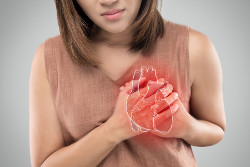
Happy Valentine’s Day! Many people think of February as the month of love, but it is also American Heart Month. Although heart disease may often be thought of as a problem for men, it is the most common cause of death for both men and women in the United States. Study data suggests that on a day-to-day basis, more women worry about getting breast cancer, even though heart disease kills six times as many women each year. Women are also less likely to call 911 when experiencing heart attack symptoms. Why? It simply doesn’t occur to them to do so. More disturbing facts:
- Heart disease is responsible for 1 in 3 women’s deaths each year (approximately one woman every minute).
- 90 percent of women have one or more risk factors for developing heart disease.
- Since 1984, more women than men have died each year from heart disease.
- While 1 in 31 American women dies from breast cancer each year, 1 in 3 dies of heart disease.
In the past, most of our knowledge about heart disease in women came from studying it in men. However, the symptoms of heart disease can be different in women vs. men, and are often misunderstood. A woman is much more likely than a man to die within a year of having a heart attack, and the gap between men’s and women’s survival rates continues to widen. Research is only now beginning to uncover the biological, medical, and social bases of the difference between heart disease in men and women. Hopefully, knowledge gained by this research will lead to the ability to specifically tailor treatment and prevention to women.
The three key heart attack risk factors for women are: high blood pressure, high LDL cholesterol, and smoking. According to the CDC (Centers for Disease Control), about half of Americans (49%) have at least one of these. Other risk factors may include diabetes, obesity, poor diet, physical inactivity, and excessive alcohol use.
Heart attack symptoms for women may include:
- Unusual fatigue that lasts for several days. Also, sudden severe fatigue
- Sleep disturbances
- Anxiety
- Lightheadedness
- Shortness of breath
- Gas-like pain or indigestion
- Pain in upper back, shoulder, or throat. Pain in jaw or pain that spreads up to your jaw.
- Pressure or pain in the center of your chest which may spread to your arm
It’s important to remember that each heart attack is different. Even if you don’t experience many of the symptoms listed above, trust your instincts. Most people know what feels normal and abnormal in their bodies. If you’re experiencing something that doesn’t feel right, get help.
Sources:
http://www.healthline.com/
https://www.health.harvard.edu/
https://www.cdc.gov/
https://www.goredforwomen.org/










